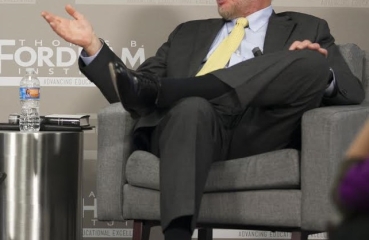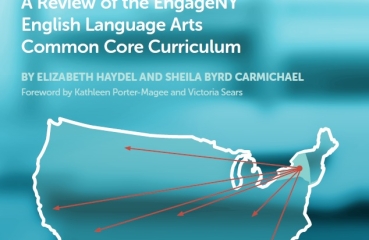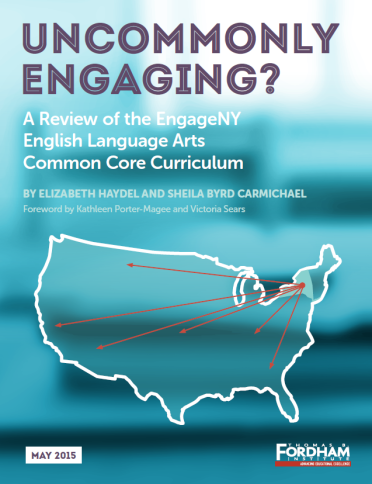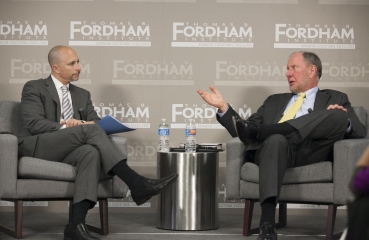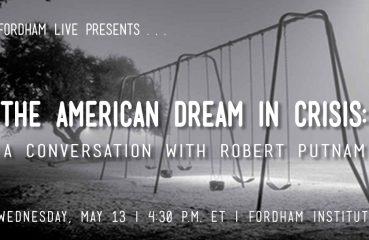PARCC recalibrates the value/burden equation
Aaron ChurchillMaybe cooler heads can now prevail in the standarized testing debate
Common Core's first breakout hit?
Robert PondiscioA free online curriculum taps a need—and a nerve.
Understanding incentives in charter authorizing
AEI just released a very good, short report on charter authorizing, “The Paperwork Pileup: Measuring the Burden of Charter School Applications.”
Education Longitudinal Study of 2002
Megan LailThe era of “college for all” has arrived. Megan Lail
New Pathways to Careers and College: Examples, Evidence, and Prospects
Michelle LernerHow to identify and promote good CTE programs. Michelle Lerner
Closing the Expectations Gap 2014
Chester E. Finn, Jr.We’re doing an awful job of ensuring that kids graduate from high school with the skills to succeed. Chester E. Finn, Jr.
Governor Markell's school choice column gets lost in the mail
We’ve learned a lot since 2001. Andy Smarick
Truth and consequences
Chester E. Finn, Jr.States shouldn’t sugarcoat the bad news when reporting Common Core test results to parents. Chester E. Finn, Jr.
The Paperwork Pileup: Measuring the Burden of Charter School Applications
Kathryn MullenA new AEI report raises the right questions—and promulgates some of the wrong answers. Kathryn Mullen Upton
EngageNY's ELA curriculum is uncommonly engaging
Kathleen Porter-Magee, Victoria McDougaldAdvocates hoped Common Core would incentivize good new curriculum. It’s happening. Kathleen Porter-Magee and Victoria Sears
NEW from Fordham: Is EngageNY uncommonly engaging?
The Education GadflySince we at Fordham began reviewing state academic standards in 1997, we have understood—and made clear—that standards alone are insufficient to drive improvements in student achievement.
Uncommonly Engaging? A Review of the EngageNY English Language Arts Common Core Curriculum
Elizabeth Haydel, Sheila Byrd CarmichaelThe need for standards-aligned curricula is the most cited Common Core challenge for states, districts, and schools. Yet five years into that implementation, teachers still report scrambling to find high-quality instructional materials. Despite publishers’ claims, there is a dearth of programs that are truly aligned to the demands of the Common Core for content and rigor.
Knowledge is literacy
Robert PondiscioEditor's note: This post has been updated to include the entirety of "Knowledge is literacy."
The American Dream in crisis: A conversation with Robert Putnam
The Education GadflyLast week, Fordham hosted Robert Putnam for a discussion of his new book Our Kids: The American Dream in Crisis, which argues that a growing opportunity gap is leaving many American children behind.
Charter law reform in Ohio: Voices from the front lines
Aaron Churchill , Jeff MurrayLeaders of high-performing schools address charter law reform efforts
Play and replay
Editor's note: This post originally appeared in a slightly different form on Sherman Dorn's blog.
Thanks to Common Core, most states will finally close the “honesty gap”
Michael J. PetrilliIn 2007, the Thomas B. Fordham Institute published what was probably the most influential study in our eighteen-year history: The Proficiency Illusion.
But, Mr. President, we have been investing in public education
Brandon L. WrightOn Tuesday, Georgetown University hosted President Obama, Harvard public policy professor Robert Putnam, and American Enterprise Institute president Arthur Brooks for a talk about poverty and opportunity.
Are parents and taxpayers being misled? The proficiency illusion strikes again
Jessica PoinerRevealing the "honesty gap"
America in miniature
Last Friday, I was sworn in as a member of the Maryland State Board of Education.
The American Dream in Crisis: A conversation with Robert Putnam
The Harvard political scientist discusses his new book and how education reform can help disadvantaged kids.
What's Math Got to Do with It?
As a former math teacher, I endorse this delightful, useful book. Dominique Coote
MNPS Expenditures and Academic Outcomes: Long Term Opportunities for the District
Kevin MahnkenFor Nashville charters, funding disparities endanger progress. Kevin Mahnken







